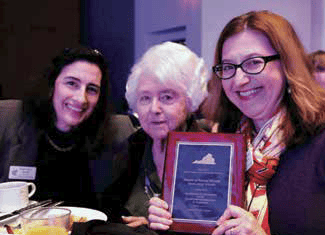In early December, Dana Cohen, a child survivor of the Holocaust and a member of the Holocaust Commission, Elena Barr Baum, director of the Holocaust Commission, and I attended the annual conference of the National Council for the Social Studies in Washington, DC, along with thousands of social studies educators from across the nation.
Through the efforts of India Meissel, a social studies teacher at Suffolk’s Lakeland High School, who has been a strong advocate for our What We Carry program since its inception, the Holocaust Commission has presented sessions about What We Carry for the past several years at the Virginia Council of Social Studies’ annual conferences. This exposure has enabled What We Carry to extend its reach across the state with the shipment of our “traveling suitcases,” which are loaned for a week to schools and other groups outside of Tidewater. This year, since the national conference was so close to Virginia, the VCSS opted to not have a state conference and rolled their presentations and awards into this national event. We fell under this umbrella as the honored recipients of the 2016 VCSS Friend of Education Award, and as presenters for a session on What We Carry.
The day began at the conference’s opening breakfast with more than 300 other early birds. Vivian Margulies, former Commission chair, also attended the breakfast. Our award was for the collective work of the Holocaust Commission, which began as an informal group of local Holocaust survivors and a few volunteers more than 35 years ago, and now numbers over 50 active volunteers, but presently only includes (unfortunately) a handful of survivors. We are one of the largest Holocaust commissions of this kind in the country and one of the most active.
The plaque we received represents something huge: many brave survivors willing to tell their stories when no one wanted to listen, passionate volunteers who spent hours supporting and building the Holocaust Commission, and willing educators who allowed us to share the lessons of the Holocaust to one of the most important audiences: students who are future citizens and leaders.
It is always nice to be recognized, but the most important part of the day was next, getting ready for our What We Carry session. The prospect of presenting to a national audience was very exciting, and daunting at the same time. The program booklet for the conference was a quarter of an inch thick, and we were one of hundreds sessions listed. At the appointed time, our full room totaled 67 people. We presented Dana’s story and of course with Dana there, the experience for those in our session was even deeper. For many of the educator participants, as she does with students, Dana had rock star status.
Our presentation was well received, and several teachers approached us requesting a suitcase as soon as possible. The current tone of public dialogue and a new tolerance for intolerance had many in our group looking for ways to address this in their classrooms. One teacher from a small town in Ohio shared that in her school, which is near a meat packing plant with many migrant workers, it was not uncommon after the election to hear students chanting “build the wall!” as well as other racist slurs.
Stories like this are heartbreaking, but to be able to share a tool with which a social studies teacher can at least try and help students break down hateful barriers is meaningful.
Our last stop at the conference was to hear the legendary civil rights activist and current Congressman from Georgia, John Lewis. Congressman Lewis and Andrew Aydin, his director of digital communication, have just completed March, the third of three autobiographical graphic novels on the Congressman’s life. Both men addressed the current national climate of intolerance. Congressman Lewis now in his late 70s, has not lost his fire, and Aydin, in his 30s, made it clear that the fight against hatred and injustice is alive and well, and current and future generations will not allow the great gains that have been made to be lost.
Social studies, which encompasses civics education, is one of the most important subjects taught today, yet shrinking budgets and rigid standards of learning often chip away at the precious time teachers have to teach in the classroom. One of the fundamental lessons of the Holocaust is the danger of how intolerance and hate can mushroom if unchecked, and unfortunately the world we live in is teaming with indifference and anger. Not being aware of and understanding the past, will profoundly impact the present and future.
– Wendy Juren Aurebach

